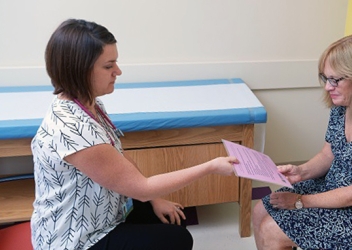Research In Action
Research In Action
Breadcrumb

As pediatric emergency medicine physicians, we’ve seen firsthand how deeply a child’s health is connected to the safety and well-being of their caregivers. At Children’s Hospital of Philadelphia (CHOP), we care for children every day whose lives are shaped by circumstances far beyond the clinical symptoms that bring them through our doors. One of the most pervasive and often hidden challenges is intimate partner violence (IPV).
IPV is a public health crisis that affects nearly half of women and a quarter of men in the U.S. during their lifetimes. When a caregiver is experiencing IPV, the impact on their child can be profound, affecting everything from physical health to emotional development and academic performance. Our pediatric emergency departments (ED) are often a critical touchpoint for these families, and we have a responsibility to respond with compassion, skill, and intention.
Why We Use Universal Education
In our recent article published in Pediatric Emergency Care, we explored how pediatric EDs can better support caregivers experiencing IPV. One of the most important shifts we’ve made at CHOP is moving away from traditional screening models that rely on disclosure and toward a more inclusive, trauma-informed approach: universal education.
Universal education means we offer IPV-related resources to every caregiver, regardless of whether they disclose abuse. This approach, endorsed by the American Academy of Pediatrics, helps normalize conversations about IPV and ensures that support is accessible to all families, not just those who feel safe enough to speak up. It’s a small but powerful way to reduce stigma and open the door to help.
We use tools like the CUES framework—Confidentiality, Universal Education and Empowerment, and Support—to guide these conversations. It’s not about asking invasive questions; it’s about saying, “We give this information to everyone because healthy relationships are part of healthy families.”
Protecting Privacy in the Digital Age
One of the challenges we face in this work is how to document IPV-related concerns in a way that protects caregivers’ privacy and acknowledges increased access to electronic health records. At CHOP, we’ve developed documentation best practices that prioritize confidentiality, using secure sections of the medical record and focusing on how IPV affects the child’s health and safety.
We also make sure caregivers understand what will be documented and why. Transparency builds trust, and trust is essential when working with families navigating trauma.
Discharge Planning That Centers Safety
When IPV is identified or suspected, discharge planning becomes more than just a checklist, it’s a lifeline. We work closely with our social work team to assess safety risks, connect families with community resources, and, when needed, develop individualized safety plans. Sometimes that means helping a caregiver find a shelter or legal support. Other times, it’s about making sure they know they’re not alone and that help is available.
Through our STOP IPV program, part of CHOP’s Center for Violence Prevention, we’ve also built strong community-medical partnerships with local organizations; Lutheran Settlement House in Philadelphia County and Laurel House in Montgomery County. These collaborations allow us to provide warm handoffs and ensure that families continue to receive support after they leave our care. IPV medical advocates from both organizations are incorporated into our medical team structure, which allows for in-person evaluation and direct referrals.
CHOP’s Broader Commitment
Our work in the ED is just one part of CHOP’s broader commitment to preventing and addressing IPV. Through the Violence Intervention Program (VIP), we provide trauma-informed care and advocacy for youth and families affected by violence. Our researchers are exploring innovative strategies, from digital screening tools to integrated behavioral health models, to improve how we identify and respond to IPV in pediatric settings. Additionally, through partnership with PolicyLab we are analyzing the past decade of referral data to better understand system procedures and future policy recommends.
We’re also contributing to national conversations, helping shape policy and practice through our involvement with Futures Without Violence and other professional organizations. It’s work we’re incredibly proud to be part of.
Moving Forward
Addressing caregiver IPV in the pediatric ED isn’t easy, but it’s essential. By embedding universal education, trauma-informed care, and strong community partnerships into our practice, we’re not just treating illness; we’re helping to break cycles of violence and build healthier futures for children and their families. In 2024 alone, we’ve offered IPV universal education to more than 30,000 families resulting in 324 referrals to our community partners.
If you’re a clinician, researcher, or advocate working in this space, we’d love to hear how your institution is approaching this work. Together, we can continue to push the field forward and ensure that every child, and every caregiver, has the opportunity to thrive.



